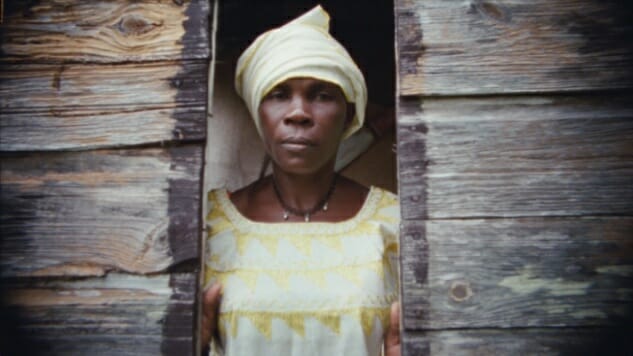Black Mother

When any advertising agency is commissioned to shoot a Jamaican tourism commercial, they’ll inevitably wend their way around to the same old hook: Bob Marley’s “One Love.” Come and visit Jamaica, the land of All Right! Everything’s all right, all the time here on the Jamrock! The ad people are just following the path most traveled (and perhaps even dictated by travel agencies and tourism boards), promoting Jamaica as a land of leisure and ease, where the sun shines, people smile, life is good, and no one wants for anything, especially spiritual assuaging.
Advertising may sell audiences on a Jamaican ideal, but with his documentary, Black Mother, director Khalik Allah achieves a goal far greater: presenting audiences with the truth, however lovely or hideous it may be. Allah’s approach takes the form of a visual essay/tone poem. It’s a fractured piece of work, a story about Jamaica the way that Hale County This Morning, This Evening is a story of Alabama. Allah’s filmmaking functions as stream of consciousness. He eschews narrative documentarian traditions. This approach poses a challenge to the viewer—Black Mother is made in a language rarely spoken in cinema, be it multiplex or arthouse. Allah throws his audience into the ocean and forces them to tread water, soaking in the country’s textures and contradictions and trauma.
Through his lens, Allah presents a nation decayed by oppression, whether political, social or even religious, and a people forced to do whatever they can to sustain themselves. That doesn’t mean Allah is committing poverty tourism. Instead, he’s a character in the film, made invisible by the tool of his trade. But he lets the people he meets tell their stories in their words, and anchors those words to truth through imagery. Granted, he puts on display the same idyllic qualities captured in luggage company Tumi’s recent collaboration with Lenny and Zoë Kravitz: Jamaica really is a gorgeous country—bright, warm and verdant beneath the Caribbean sun. But Tumi casts Jamaica’s ghosts in stunning repose. They’re to be breathlessly ogled by people ignorant of what it is they’re actually ogling. Allah provides viewers proper context. No sooner does the film bask in Jamaica’s natural bounty than it’s whisked away to monuments like Sam Sharpe square to hear a lesson on his assassination. (Plantation owners bumped him off in 1832 to avoid having to pay their slaves in 1838, the year slaves were given full emancipation under Britain’s Slavery Abolition Act.)